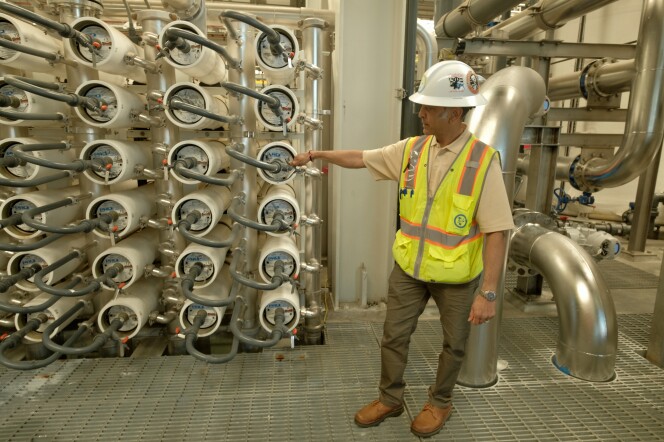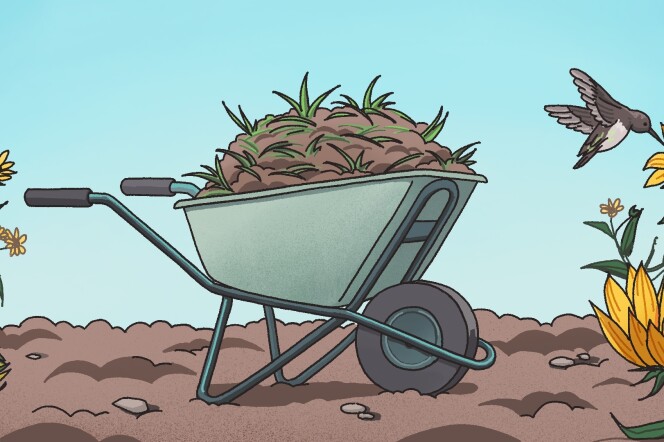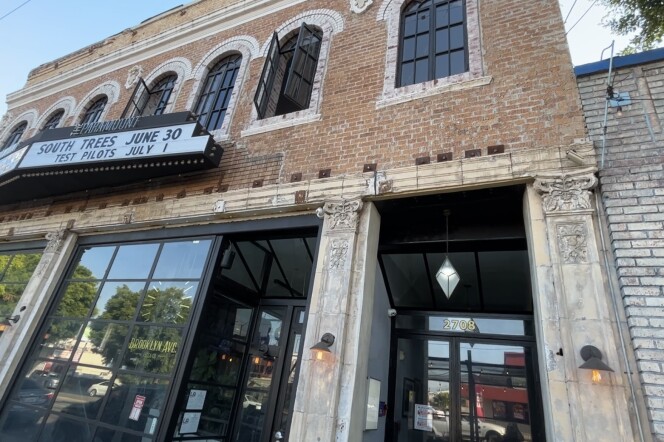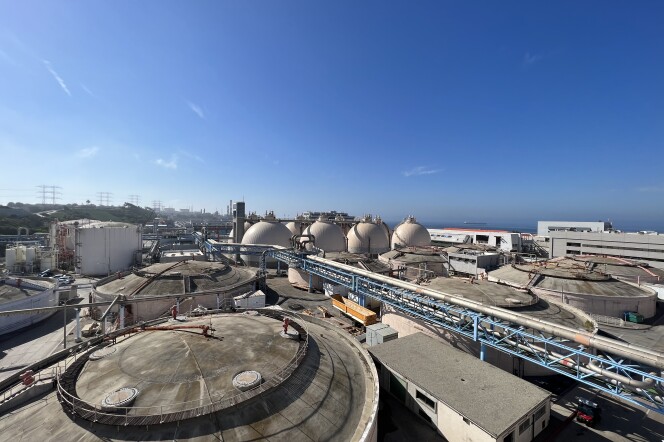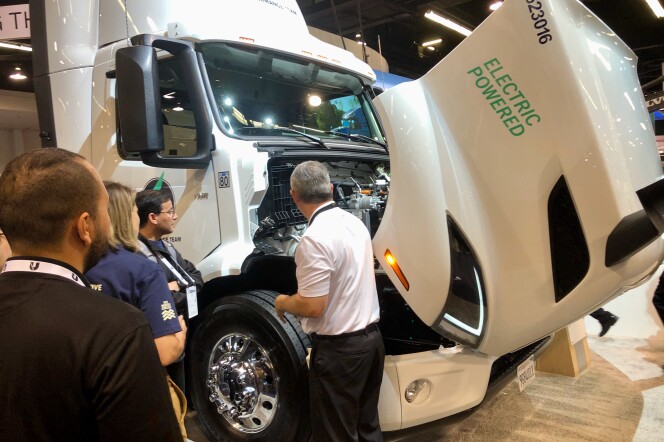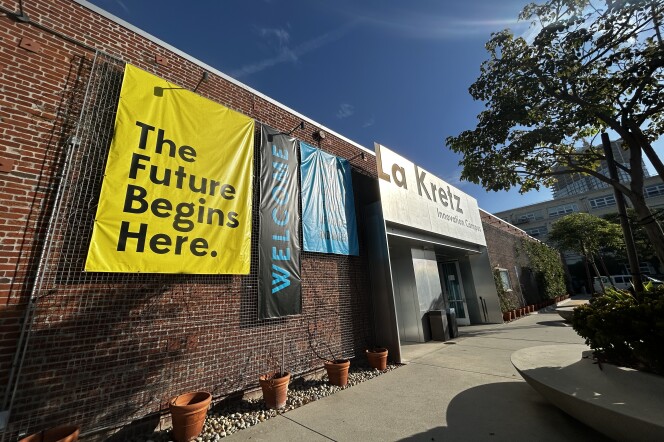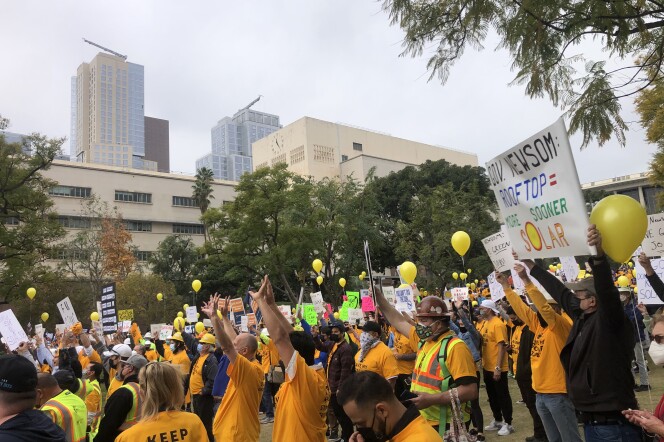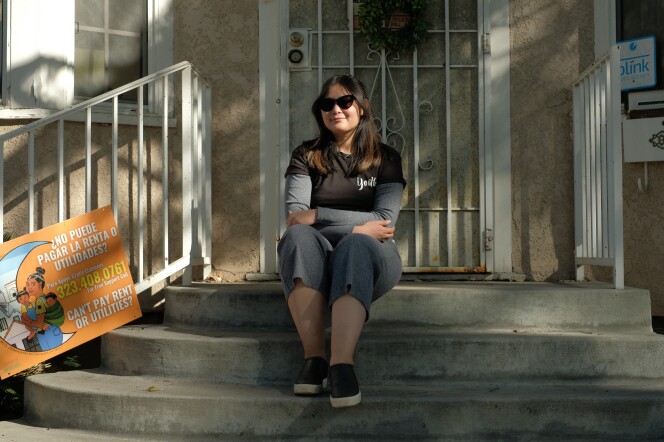
Next Up:
0:00
0:00
-
Listen Listen
Your Guide To The Climate Emergency
Year-round wildfires, rising sea levels, scorching heat — we’re already experiencing the impacts. How much worse it gets remains to be seen, but there's hope — and a lot we can do.
Climate Solutions 2024: The future of food
-
If you have a green bin — and if you rent in the city of L.A., you should — it will probably cost you $0 and a little freezer space to start composting.
-
Brother and sister duo Phil and Lauren Pretty’s restaurant is housed in a small converted craftsman in Long Beach. What they lack in physical space, they make up for in sustainability.
-
One of the world’s most high-tech indoor vertical farms is growing leafy greens in Compton.
-
Grocery stores are filled with foods that are produced in ways that contribute to global heating, but you could get off that cycle with the free fruit trees across Southern California.
-
Nearly half the water drawn from the Colorado River goes to grow feed for beef and dairy cows. Researchers say modest changes in American diets could help the river — and the climate.
-
As climate change makes the classic green lawns more unsustainable, some have traded their grass for lettuce, avocados, and other crops. Could this slice of suburbia, with more than 1.8 million people living across 260 square miles, be home to the next farming revolution?
-
Bold cabernet sauvignon wines made Napa Valley famous. Now, hotter temperatures are starting to damage the grapes, so some wineries are starting to experiment.
-
Farmers in California are trying to plant crops that don't require a lot of water. Some are turning to growing agave as a response to a warming state.
The Basics
Scientists say big changes this decade can help us avoid the worst impacts of climate change. That’s why we want to equip you with information you can use.
Read this overview, and then use the guide to understand more about the climate crisis, including what's being done to address and adapt to it — and how you can take part.
Read this overview, and then use the guide to understand more about the climate crisis, including what's being done to address and adapt to it — and how you can take part.
Solutions — Near And Far
For Climate Solutions Week 2023, we explored how we all can make a difference in slowing the rate of climate change with a look at solutions that work.
-
When people talk about climate change, you often hear hopelessness. But what if we reframe the conversation? Humans drive global warming; that means humans can find solutions to change the trajectory.
-
The military is among the largest buyers of independent power systems known as microgrids. They make tactical sense; and environmentalists hope they can help the transition from fossil fuels.
-
Highly reflective roofs can help cool our homes, communities and the globe.
-
To state the obvious: California has a water problem. But experts say conservation alone can’t solve our water woes. Should recycled sewage water play a bigger role?
-
A new report says a 75% cut in plastics is needed to limit global warming to 1.5 degrees Celsius.
-
Fourteen teams of young engineers will compete to see who can build the most sustainable home.
Global Context
-
The final — and most critical — analysis from the United Nations Intergovernmental Panel on Climate Change laid out a stark picture of the future. Here's what that means for L.A.
-
A United Nations report says billions of people are already suffering from the impacts of the climate crisis... and Southern California inhabitants are not excluded.
Climate Emergency Questions
Fires. Mudslides. Heat waves. What questions do you need answered as you prepare for the effects of the climate emergency?
Take Action
The action needed has to come from every level — from government, from industry, and from individuals like you.
Read on to learn what efforts are under way; how changes in policy and technology affect you, your community and your pocket; and what you can do personally to get involved.
Read on to learn what efforts are under way; how changes in policy and technology affect you, your community and your pocket; and what you can do personally to get involved.
Things You Can Do At Home
-
LA's composting program for single-family residences is fully in action, but there's a long way to go before all businesses and rental properties are participating. In the meantime, find a local community composter!
-
Angelenos can help change L.A.'s water future by ditching grass. Here’s how to update your turf and get paid to do it.
-
There's an unprecedented amount of rebates and tax credits available to electrify at home. Here's your guide on how to access that money.
Prepare For Emergencies
-
The climate crisis is requiring all of us to be prepared to respond at any time, especially during high heat and fire weather.
-
California’s wildfires have gotten increasingly destructive and deadly. Here's what you can do to get your home and family ready for a fire emergency.
-
Heat
-
A climate organization says rider input is necessary to implement cooling strategies that work.
-
There are no legal requirements in L.A. to keep indoor temperatures sufficiently cool.
-
Cool materials can help in certain situations, but they're just one tool in adapting to a hotter normal.
-
Grassroots groups are working to retrofit existing trusted community spaces with solar panels and battery power to become climate "resilience hubs."
-
Scientists brought in trees from around the world to see which ones can thrive in hot and dry conditions with minimal water. Will these soon line a road near you?
-
The L.A. Department of Water and Power's Board of Commissioners voted unanimously to end the practice of shutting off power when people can't pay their bills during extreme heat.
Water
-
To state the obvious: California has a water problem. But experts say conservation alone can’t solve our water woes. Should recycled sewage water play a bigger role?
-
From Sun Valley To South Central, "Green Alleys" are helping to alleviate flooding in neighborhoods while making space for nature in a paved-over city.
-
The region's largest water supplier plans to recycle more wastewater than ever before so it can take less from the Colorado River.
-
New water conservation restrictions … ongoing drought … California clearly has a water problem.
-
Most of our rainwater washes out to the ocean— often carrying trash and other pollutants. This South L.A. park catches and treats it.
-
Not all of this rain goes to the ocean, but increasingly unpredictable and intense storms driven by climate change are making stormwater capture more difficult.
Economy
-
With cities aiming to recycle more water amid drought, a waning workforce presents a challenge.
-
"Zero emission" vehicles are a lot different from your old internal combustion engine, and Southern California community colleges are aiming to bridge the skills gap.
-
More diversity in climate tech is good for business and society, but there's a long way to go to move the needle.
Renewable Energy
-
California has been a leader in generating solar power on rooftops, but the state hasn't seen the same success with subscription-style "community solar" projects.
-
We're still at the start of the transition, which means a lot of fine lines to walk. But the science is clear: the long-term benefit outweighs the cost.
-
The public's response and a dramatic expansion in solar energy battery storage helped significantly.
-
Small solar businesses and clean energy advocates worry it'll gut the industry, but the state says the change will boost access for Californians who can't afford solar.
-
The City Council unanimously voted on Wednesday in favor of banning new oil and gas drilling and beginning the process of completely phasing out the existing production.
-
"Green" hydrogen can help cut planet-heating emissions, but opponents worry it'll worsen local air pollution and extend the life of the fossil fuel industry.
Electrification
-
A coalition of community members and transportation justice advocates are working together to bring more e-bikes to LA neighborhoods with the worst air pollution.
-
Electric vehicles were all the rage in the early 1900s, but they were soon abandoned. What happened and what can the history of EVs tell us about the future of transportation?
-
All-electric building mandates are here. But what do they really mean?
-
L.A. requires all new buildings to be all-electric, but retrofitting existing buildings is the bigger challenge — and has implications for renters.
-
The rules passed by the state Air Resources Board are the first of their kind — anywhere — and will likely have ripple effects, particularly in Southern California communities that have some of the dirtiest air in the nation.
-
Some companies are well on their way to transitioning their fleets to all-electric.
More Climate and Environment Coverage
-
Temperatures will hover in the mid 70s to low 80s.
-
When the modern electric vehicle was still in its infancy, drivers worried that vehicles would need expensive battery replacements within a few years.
-
The feathered duo, Jackie and Shadow, are getting another chance at raising chicks after the first two eggs were breached by ravens last month.
-
A judge tentatively ruled federal intervention wasn't enough to let Sable Offshore restart a pipeline shut after a massive Santa Barbara oil spill.
-
The deposition was released by representatives of the thousands of families affected by the Palisades Fire.
-
The Aquarium of the Pacific released a rehabilitated green sea turtle back to the wild after a lengthy recovery.
-
Visitors are being asked to enjoy the bloom at Diamond Valley Lake thoughtfully, so stay on the trail and don’t pick the flowers.
-
Many farmers have had to fallow land as a state law comes into effect limiting their access to water. There's now a push to develop some of that land … into solar farms.
-
California schools faced repeated planned power outages in 2024-25 as Edison cut electricity to prevent wildfires, forcing closures and costly backup power solutions.
-
The Inland Empire will be warmer today.
Sponsored message













